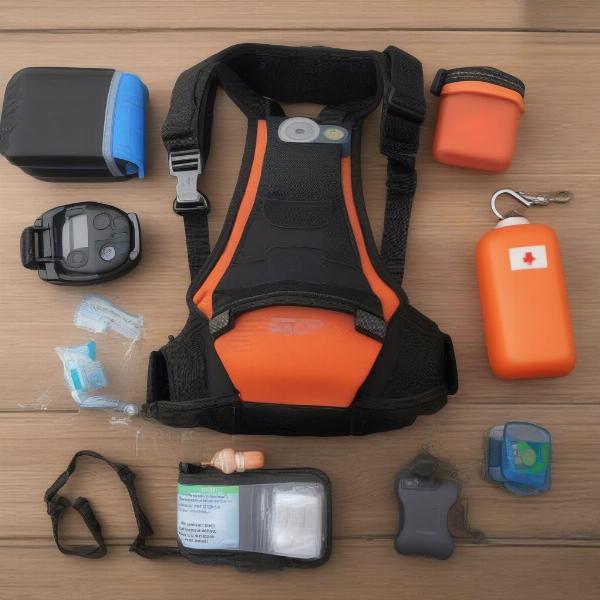Tracking dogs possess an incredible ability to follow scents, making them valuable partners in various fields, from search and rescue to law enforcement. Choosing the right tracking dog breed requires careful consideration of temperament, trainability, and physical characteristics. This guide will explore popular tracking dog breeds and delve into the key factors to consider when selecting a canine companion for tracking purposes.
Key Characteristics of Tracking Dog Breeds
What makes a dog a good tracker? Several key traits contribute to a dog’s tracking prowess. A strong sense of smell is paramount. Excellent stamina and endurance are crucial for pursuing scents over long distances and challenging terrains. Focus and determination are essential for staying on task, even with distractions. Finally, trainability plays a significant role, as tracking dogs must learn to follow commands and interpret their handler’s cues.
![]() Dog Tracking Equipment
Dog Tracking Equipment
Popular Tracking Dog Breeds
Several breeds stand out for their exceptional tracking abilities. The Bloodhound, with its legendary nose, is renowned for its ability to follow even the faintest of scents over vast distances. German Shepherds, known for their intelligence and versatility, are frequently employed in police and military work, including tracking and apprehension. Beagles, though smaller, possess an excellent sense of smell and are often used for tracking small game. Other notable tracking breeds include the Basset Hound, Coonhound, and American Foxhound. Each breed has unique strengths and weaknesses, so choosing the right one depends on the specific tracking task. waterproof dog walking boots are essential for keeping your tracking dog’s paws dry and comfortable in various terrains.
Bloodhounds: The Scent Masters
Bloodhounds are arguably the most famous tracking dog breed. Their highly sensitive noses and unwavering determination make them exceptional at locating missing persons and tracking game.
German Shepherds: Versatile Trackers
German Shepherds are intelligent, adaptable, and highly trainable, making them suitable for various tracking tasks, including search and rescue, law enforcement, and military work.
Beagles: Small but Mighty Trackers
Despite their small size, Beagles possess a powerful sense of smell and are often used for tracking small game like rabbits. Their tenacity and focus make them effective trackers in various environments.
Choosing the Right Tracking Dog Breed
Selecting a tracking dog breed is a crucial decision. Consider the type of tracking you intend to do. Will you be tracking game, searching for missing persons, or participating in competitive tracking events? Research different breeds and their specific aptitudes. Consider your lifestyle and living situation. Some breeds require more exercise and space than others. If you are a first-time dog owner, a breed known for its trainability and easygoing temperament might be a better choice than a more independent or challenging breed. butterfly dog costume can be a fun way to dress up your tracking dog when they’re not on duty.
Training Your Tracking Dog
Proper training is essential for any tracking dog. Start early, using positive reinforcement methods. Consistency and patience are key. Enroll in a tracking class or work with a professional dog trainer to develop your dog’s tracking skills and strengthen your bond. dog hunting vest orange is a must-have if you plan on tracking in areas with hunters.
Conclusion
Tracking dog breeds offer a unique combination of skill, intelligence, and dedication. By carefully considering the factors discussed in this guide, you can choose the perfect tracking companion to join you on your adventures. Whether you’re a seasoned tracker or just starting, the bond you forge with your tracking dog will be a rewarding experience.
FAQs
- What is the best tracking dog breed for beginners? Beagles and German Shepherds are often recommended for beginners due to their trainability and relatively even temperaments.
- How do I start training my dog to track? Start with basic scent work exercises and gradually increase the difficulty. Professional training classes are highly recommended.
- What equipment do I need for tracking? Essential equipment includes a tracking harness, a long leash, and a GPS tracker. dog tracker ireland provides reliable tracking solutions for dog owners.
- How much exercise does a tracking dog need? Tracking dogs require a significant amount of exercise to stay physically and mentally fit.
- Are tracking dogs good family pets? Many tracking breeds also make excellent family pets, but it’s important to research each breed’s temperament and needs.
- How do I find a reputable breeder of tracking dogs? Research breeders carefully and look for those who prioritize health and temperament. Attend dog shows and talk to experienced trackers for recommendations.
- What is the average lifespan of a tracking dog? Lifespans vary depending on the breed, but most tracking dogs live for 10-14 years.
About ILM Dog
ILM Dog is your premier online resource for all things dog-related. We offer expert advice on dog breeds, health, training, nutrition, grooming, and much more. Whether you are looking for tips on choosing the right breed, understanding your dog’s behavior, or finding the best products and accessories, ILM Dog is here to support you every step of the way. We offer specialized expertise in breed selection, health & wellness, training, and choosing the right products for your furry friend. Contact us today to learn more! Email: [email protected], Phone: +44 20-3965-8624. best tracking dogs for deer offers detailed information on the best breeds for deer tracking.
